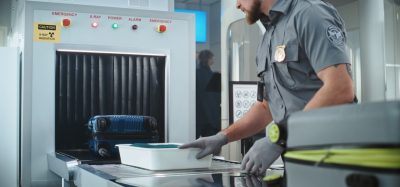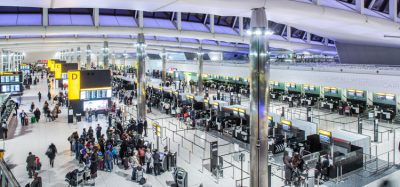ATL welcomes Spirit Airlines’ self-bag drop and passenger biometrics
Posted: 1 April 2022 | International Airport Review | No comments yet
Hartsfield-Jackson Atlanta International Airport has welcomed Spirit Airlines new automated self-bag drop with a biometric photo solution, to ensure a frictionless check-in experience for passengers.
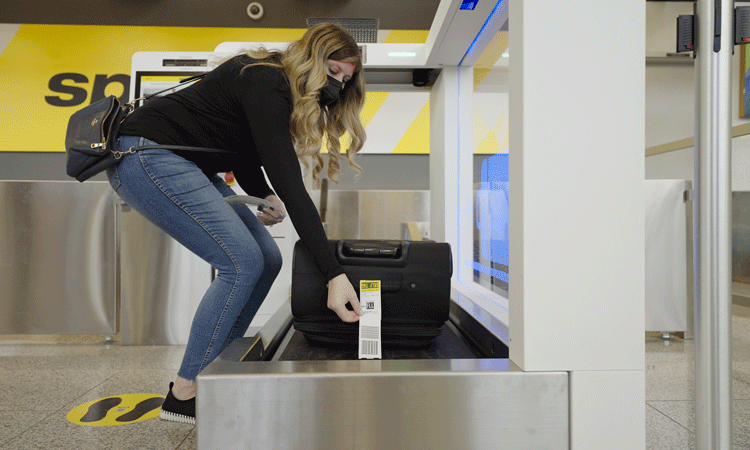

Credit: Spirit Airlines
Spirit Airlines has unveiled the ‘Best Airport Innovation’ of 2021 is now in operation at Hartsfield-Jackson Atlanta International Airport (ATL) and is already streamlining the check-in experience. Spirit’s passengers at ATL are seeing shorter check-in times thanks to Spirit’s automated self-bag drop with biometric photo-matching system, which represents a new paradigm for the U.S. airline industry.
‘Self-bag drop’ systems allow for self-service so passengers can check bags directly without working with an agent. These systems are widely used at major international airports and have been growing in acceptance in the U.S. The machines are equipped with a biometric photo-matching system that compares a scan of government-issued identification with a photo of the passenger for verification. Following an initial testing period at ATL with both manual ID check and biometric opt-in, the solution will eliminate the need to hand government-issued identification to an agent when checking baggage.
Spirit developed the nation’s first biometric photo-matching solution for domestic air travel in 2019 with its partner Materna Intelligent Passenger Solutions (IPS) North America. Spirit was also the first to pursue combining it with automated self-bag drop capabilities to reduce face-to-face interaction. The system is also operating at New York’s LaGuardia Airport (LGA), Chicago O’Hare (ORD) and Dallas Fort Worth (DFW), and it was recently recognised for two prestigious awards: The ‘2021 Best Airport Innovation’ by the APEX/IFSA Awards, and also a Gold Stevie® Award winner for The Best New Transportation Product or Service in The 2021 American Business Awards®.
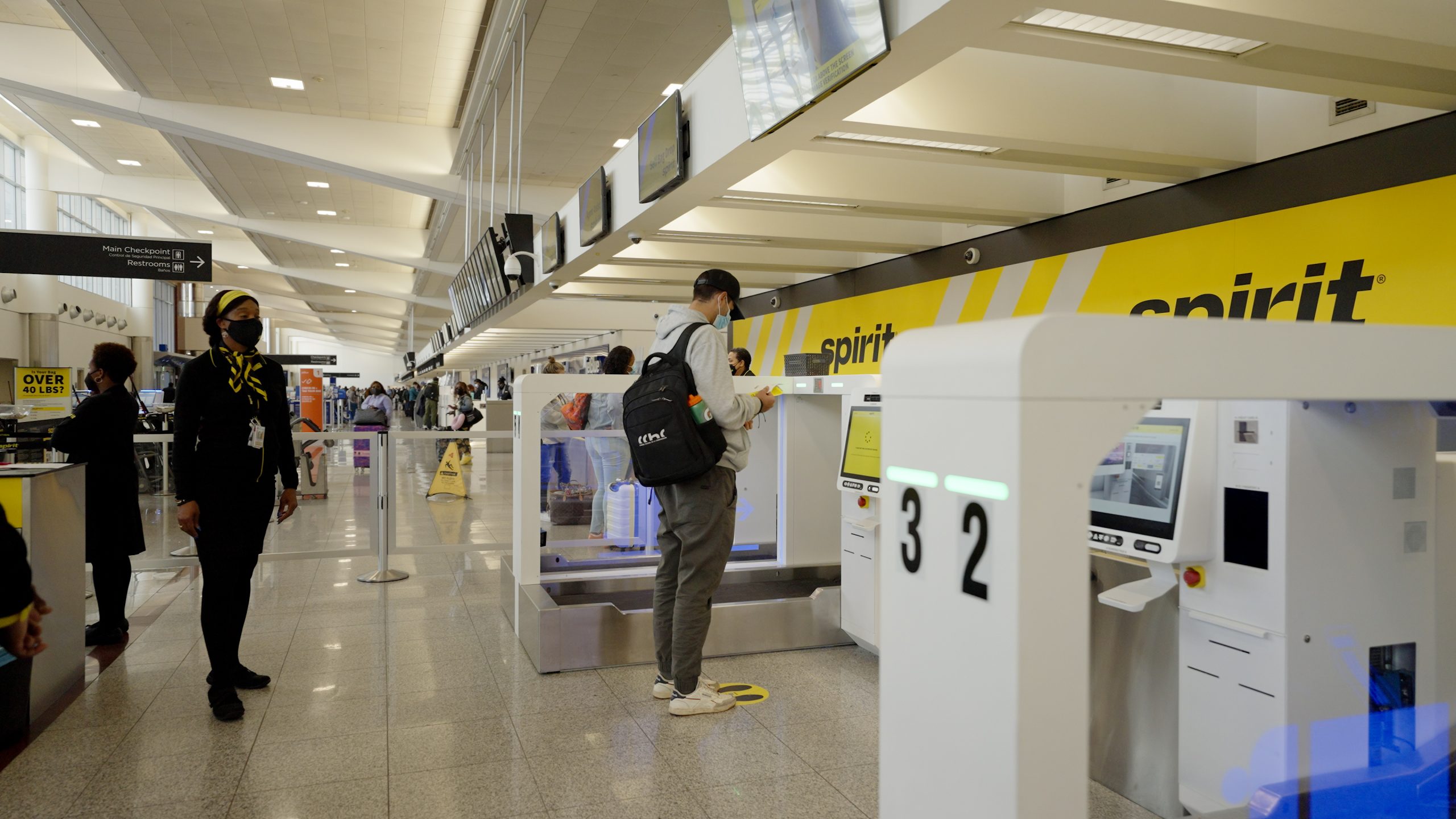

Self-bag drop at Hartsfield-Jackson Atlanta International Airport with Spirit Airlines (credit)
Here’s how the solution works:
- Passengers start by tagging their own checked bags after checking in at the kiosk and then proceed to the self-bag drops
- Passengers are advised of the biometric option after scanning their boarding pass at the self-bag drop unit. They may either opt in and continue unassisted or opt out for agent-assisted service
- Once the customer opts in, the unit instructs them to scan their ID on the built-in hardware.
- The unit compares its scan of the photo on the ID with a facial scan captured by its on-board camera, along with comparing ID information with the passenger’s reservation details. None of the data is transmitted to any government agency
- A successful match initiates the rest of the bag check-in process. Passengers are instructed to place their bags on the conveyor belt attached to the unit, which then scans the bags, weighs them, accepts payment for any additional services, and sends them straight into their airport’s checked baggage system without further action from the passenger.
“Hartsfield-Jackson prides itself on its efficiency and safety,” said ATL General Manager, Balram Bheodari. “Through advances in innovation, this project is designed to increase both, and we welcome such efforts.”
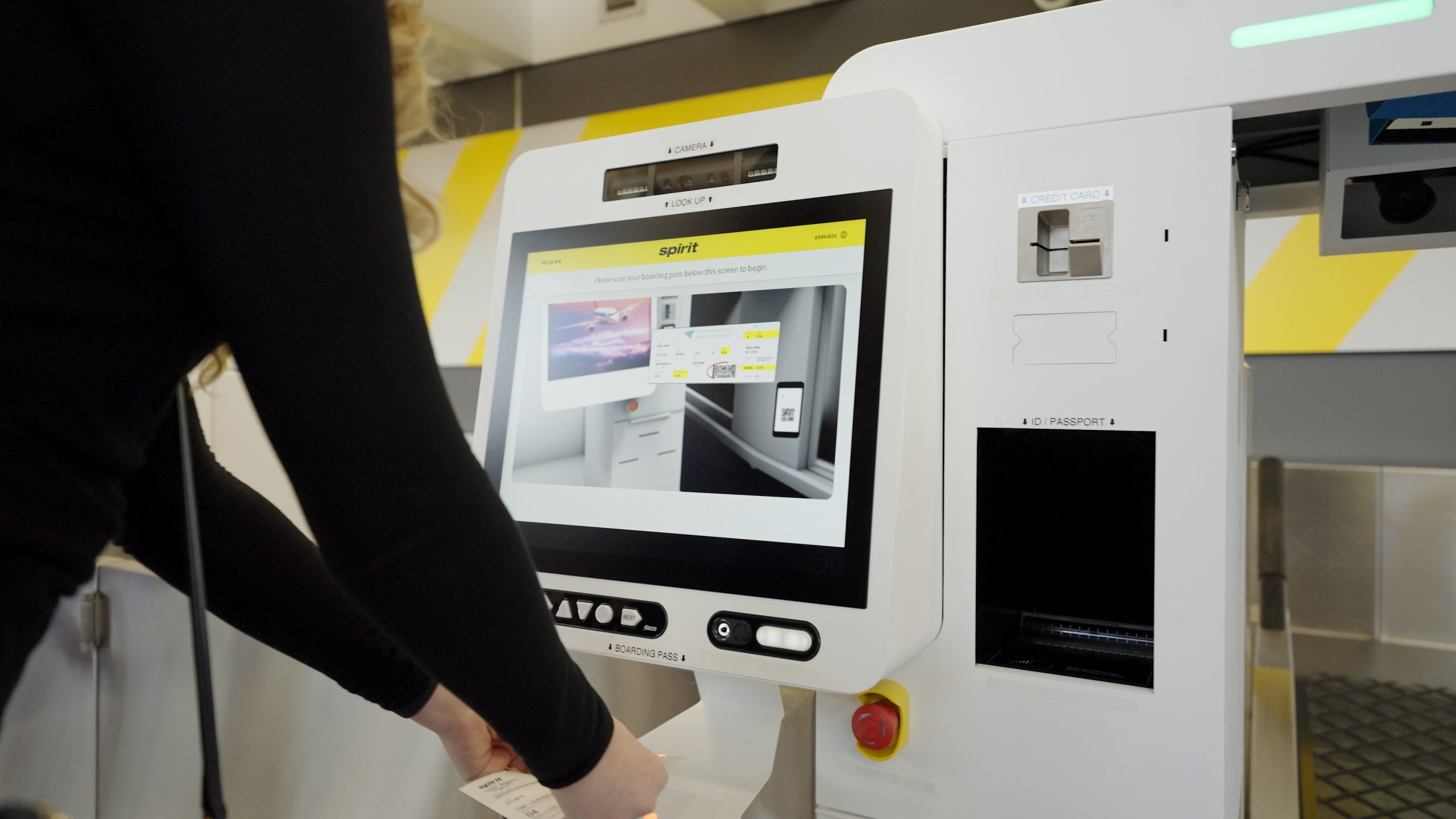

Credit: Spirit Airlines
“We’re on a mission to find innovative opportunities to continue improving every facet of the passenger experience, to include this investment in self-service so passengers spend less time in lobbies,” said Mike Byrom, Vice President of Airport Services for Spirit Airlines. “Our customers are tech-savvy, and they appreciate options for controlling their travel journey. Another reason why the technology is advantageous for passengers is because it complements our staffing and helps preserve consistency of service.”
TAKE A READ:
Hartsfield-Jackson International Airport releases first carbon policy
Spirit Airlines announces additional flight crew bases in Miami and Atlanta
Spirit passengers currently check an annual daily average of about 1,000 bags at ATL, and each of which represents a face-to-face interaction that can be streamlined. Testing data shows the new procedure drops average processing time to just 70 seconds per passenger, reducing time spent at bag check by 30 per cent. Additionally, customers can take advantage of the time savings and reduction in interactions whether they’re travelling domestically or internationally.
The self-bag drop system uses software capable of analysing key physical features on more than 50,000 forms of ID from nearly 200 countries that a passenger could potentially use when travelling in the U.S. Combined with the units’ scanning hardware, the software confirms the authenticity of an ID and rejects fraudulent documents as passengers check their baggage.
Join our free webinar: Transforming Airport Security – Innovation, Impact, and the Passenger Experience
The landscape of airport security is undergoing a profound transformation, driven by evolving threats, technology, and passenger expectations. This webinar focuses on how AtkinsRéalis has been transforming security processes at some of the world’s busiest airports with smarter, more adaptive solutions.
Date: 4 Nov | Time: 14:00 GMT
REGISTER NOW TO SECURE YOUR SPOT
Can’t attend live? No worries – register to receive the recording post-event.
Related topics
Airport development, Baggage handling, Biometrics, Contactless / Touchless technology, Digital transformation, New technologies, Operational efficiency, Passenger experience and seamless travel, Passenger volumes, Safety, Self-service, Terminal operations, Workforce
Related airports
Dallas Fort Worth International Airport (DFW), Hartsfield-Jackson Atlanta International Airport (ATL), LaGuardia Airport (LGA), O'Hare International Airport (ORD)



